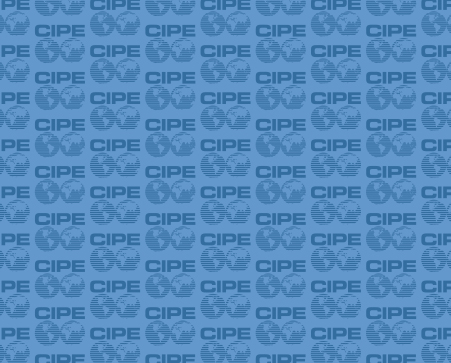
The biggest changes can start with small steps – particularly in the effort to change cultural barriers and to ease decades-old national tensions. Often it is the private sector, seeking to open new markets, explore possibilities, and expand trade and commerce, that is at the forefront of such changes.
Last week in Lahore, Pakistan, CIPE organized the third in its series of training and networking sessions for a group of women’s business leaders from across South Asia, helping bring about a range of positive steps – both for national understanding and opportunity for traditionally marginalized women.
This network, which CIPE has been developing with the support of the National Endowment for Democracy, includes participants from major and emerging chambers of commerce and business associations from Pakistan, India, Bangladesh, Nepal, Sri Lanka and Bhutan.
The idea to bring together representatives from these countries – particularly given the tensions between India and Pakistan, and the history between Bangladesh and Pakistan, was not guaranteed to succeed. But after two meetings, one last winter in Dhaka and then again in the spring in Kathmandu, it was becoming clear that these women business leaders were growing closer, learning from one another, sharing ideas and information, and finding ways to strengthen their organizations.
When the participants decided they wanted to hold the third meeting in Lahore, CIPE knew right away that it would pose challenges, but the participants were committed to the idea and the planning began. Bringing a representative from the Federation of Indian Chambers of Commerce Ladies’ Organization in particular meant a lengthy wait for a visa that at last came through, and was a positive note to kick off a productive and exciting two days of learning and networking.
In many ways, the highlight of the event was a dinner in the participants’ honor at the Lahore Chamber of Commerce and Industry hosted by one of the network members, Aasia Khan, who leads the Women’s Resource Center at the Lahore Chamber. The dinner began with the playing of the Pakistani national anthem, and all in attendance rose in respect, including women business leaders from Pakistan, together with Indian, Bangladeshi, Nepalese, Sri Lankan and Bhutanese colleagues. The dinner was covered extensively by the local press, and the symbolism of representatives of these countries sharing the head table and shaking hands with assorted dignitaries, including the chief guest, Punjab Governor Chaudhry Muhammad Sarwar, was not lost on anyone in the room.
Equally important was the fact that among the Pakistani participants were women business leaders not just from Lahore and the Islamabad Women’s Chamber, but also from the South Punjab Women’s Chamber of Commerce and the Peshawar Women’s Chamber of Commerce, who are working every day to break down the cultural barriers that too often prevent more than half of Pakistan’s population from being full stakeholders in their country’s future. In that respect, the remarks on the need for full women’s economic and political empowerment for Pakistan’s development, which were offered by Lahore Chamber President Farooq Iftikhar and by Governor Sarwar, were important calls for change.
For the Peshawar Women’s Chamber in particular, the ability to meet with key political and business leaders helps to support an advocacy program that the organization is carrying out to advance women’s entrepreneurship in a region where women face extreme challenges to economic participation. That project itself is the result of the link made through this networking program between the Peshawar Women’s Chamber and the Bangladesh Women’s Chamber of Commerce and Industry, a long-time CIPE partner and advocate for women’s economic issues in that country.
With support from CIPE, these women business leaders are helping to bring about big changes in a difficult region. As this network continues to grow stronger, the participants are hopeful of more positive results to come. Watch this blog for more information about the results of the two-day Lahore session, including some moving feedback from the women themselves.
Marc Schleifer is Senior Program Officer for South Asia at CIPE.
Published Date: September 24, 2013